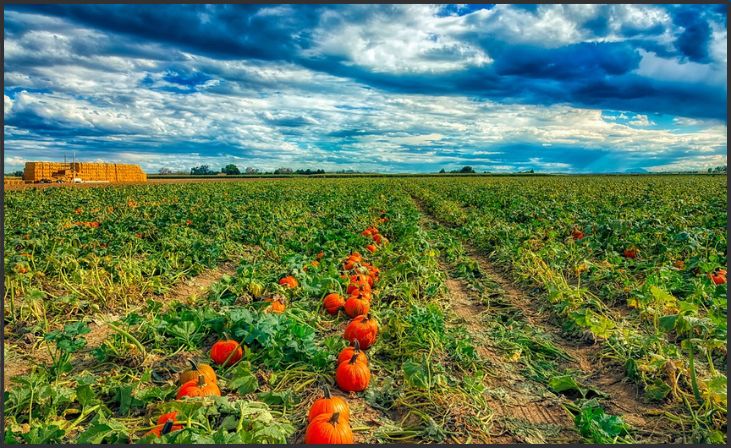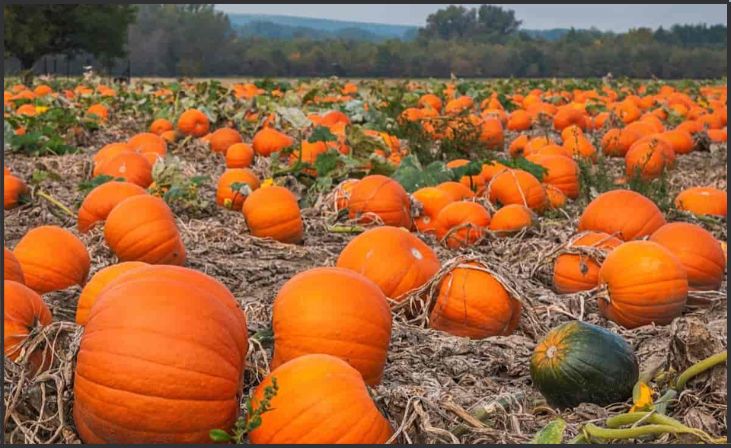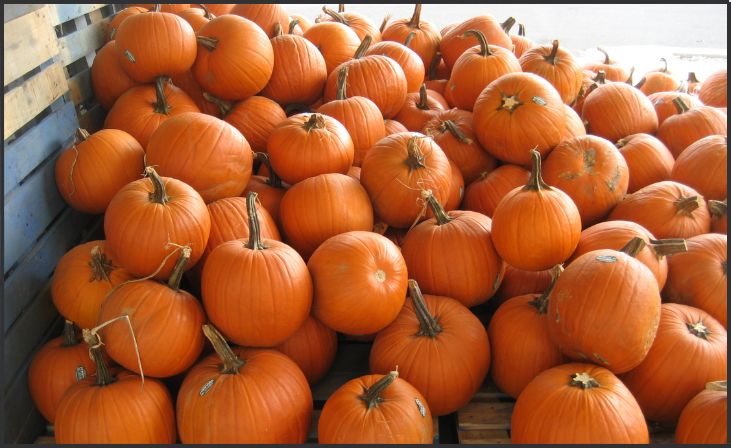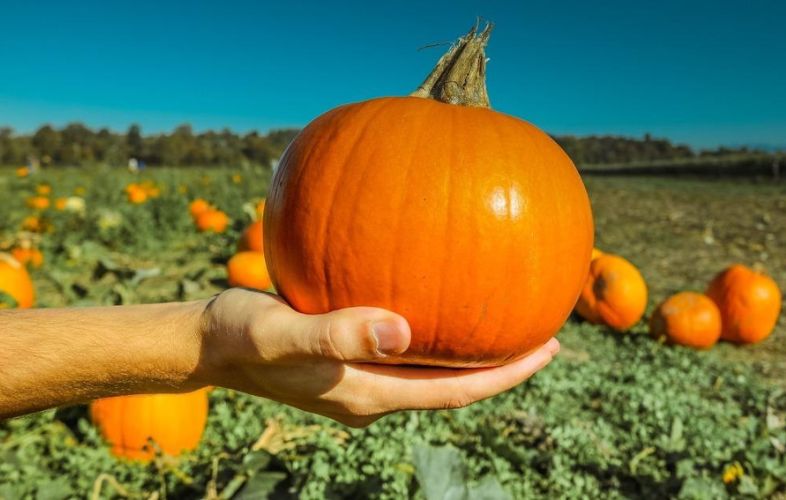Organic Pumpkin Farming Practices – Welcome to the realm of organic pumpkin farming, where nature’s bounty meets sustainable practices. Organic pumpkin farming is a holistic approach that harmonizes modern cultivation techniques with ecological balance. By steering clear of synthetic pesticides and fertilizers, organic farmers prioritize soil health, biodiversity, and consumer well-being.
These devoted cultivators employ natural composting, crop rotation, and integrated pest management to nurture thriving pumpkin patches while preserving the environment. The result? Nutrient-rich, vibrant pumpkins free from harmful residues. Join us as we delve into the art and science of organic pumpkin farming, where every orange gem tells a tale of responsible agriculture and a greener future.
Organic Pumpkin Farming Practices
Soil Health: The Root of Organic Success
Organic pumpkin farming begins with a focus on soil health. Healthy soil teeming with diverse microorganisms provides a fertile foundation for robust pumpkin growth. Farmers often adopt practices such as composting, cover cropping, and crop rotation to enhance soil fertility without relying on synthetic fertilizers. These methods improve water retention, prevent erosion, and contribute to the overall resilience of the farming ecosystem.
Natural Pest Control: Nurturing a Balanced Ecosystem

Conventional agriculture often resorts to chemical pesticides to combat pests, but organic pumpkin farmers employ a more sustainable approach. By encouraging natural predators, such as ladybugs and predatory insects, farmers create a balanced ecosystem where pests are kept in check without the need for harmful chemicals. Companion planting, which involves growing other plants alongside pumpkins to deter pests, is another effective strategy in organic pumpkin farming.
Read Also: Top Pumpkin Growing Tips for Garden Enthusiasts
Non-GMO Seeds: Preserving Genetic Integrity
Selecting non-genetically modified organism (GMO) seeds is a fundamental aspect of organic pumpkin farming. This choice aligns with the principles of maintaining genetic diversity and promoting seed sovereignty. Non-GMO pumpkins not only contribute to a healthier environment but also preserve the integrity of traditional pumpkin varieties.
Weed Management: Embracing Natural Solutions

Weeds can compete with pumpkins for nutrients and sunlight, affecting overall yield. Instead of relying on synthetic herbicides, organic pumpkin farmers implement manual weeding, mulching, and the use of natural weed suppressors. These methods not only control weed growth but also contribute to the long-term health of the soil.
Water Conservation: Drip Irrigation and Sustainable Practices
Water is a precious resource, and organic pumpkin farming emphasizes efficient water use. Drip irrigation systems, which deliver water directly to the base of the plants, minimize water wastage. Additionally, farmers employ rainwater harvesting techniques to make the most of natural water sources, reducing dependence on external water supplies.
Importance of sustainable practices for pumpkin cultivation

Sustainable practices are paramount in pumpkin cultivation due to their profound impact on both the environment and the overall quality of produce. Here’s why embracing sustainability is essential for successful and responsible pumpkin farming:
Environmental Preservation
Sustainable practices minimize the negative impact of farming on ecosystems. By avoiding synthetic pesticides and fertilizers, organic pumpkin farming reduces soil and water contamination, safeguarding aquatic life and promoting healthier soils.
Biodiversity
Sustainable methods encourage a diverse range of plants and organisms, creating a balanced ecosystem that naturally regulates pests and diseases. This reduces the need for chemical interventions and fosters a more resilient environment.
Soil Health
Sustainable practices prioritize soil quality through techniques like cover cropping and composting. This maintains soil structure, fertility, and microbial diversity, leading to healthier root systems and more robust pumpkin plants.
Water Efficiency
Water is a precious resource. Sustainable practices, such as mulching and drip irrigation, ensure that water is used efficiently, reducing wastage and conserving this vital element.
Long-Term Viability

By avoiding the depletion of soil nutrients and promoting natural processes, sustainable pumpkin farming ensures the long-term viability of farmland. This means future generations can continue to cultivate pumpkins without facing degraded land.
Responsible Pest Management
Integrated Pest Management (IPM) techniques in sustainable farming focus on understanding pest lifecycles and using natural predators to control populations. This approach reduces the need for harmful chemicals.
Healthier Produce
Organic pumpkin farming produces pumpkins with fewer synthetic residues, making them safer for consumers’ health. Many people are concerned about pesticide residues, making organic produce an attractive option.
Community Support
Embracing sustainability in pumpkin farming can enhance community relationships. Consumers are increasingly drawn to products that are produced responsibly, benefiting local farmers and economies.
Climate Resilience
Sustainable practices often promote soil carbon sequestration and water retention, making farming systems more resilient to climate changes such as extreme weather events.
Global Responsibility
Agriculture plays a significant role in climate change due to its emissions and land use. Sustainable pumpkin farming contributes to mitigating these impacts by reducing the carbon footprint and fostering a more balanced ecosystem.
Read Also: Successful Pumpkin Cultivation At Home
Organic pumpkin farming practices within detail

Organic pumpkin farming involves a comprehensive set of practices that prioritize soil health, biodiversity, and ecological balance while avoiding the use of synthetic chemicals. Here’s a detailed breakdown of the key practices involved:
Soil Preparation and Management
Composting: Organic farming starts with enriching the soil. Compost, a mixture of organic materials like kitchen scraps, yard waste, and manure, is used to improve soil structure and provide essential nutrients.
Cover Cropping and Green Manure
Planting cover crops like legumes adds organic matter to the soil when turned under, improving fertility and preventing erosion. These cover crops also fix nitrogen from the atmosphere, reducing the need for synthetic fertilizers.
Seed Selection and Planting
- Choosing Organic Seeds: Certified organic pumpkin seeds are chosen to ensure that the entire cultivation process adheres to organic standards from start to finish.
- Planting Methods: Depending on the pumpkin variety, seeds can be directly sown or started indoors for later transplanting. Timing is crucial to ensure optimal growing conditions.
Crop Care and Maintenance
- Irrigation: Drip irrigation or soaker hoses are used to provide water directly to the plant roots, minimizing water wastage and reducing the risk of diseases caused by wet foliage.
- Mulching: Organic farmers use natural materials like straw or leaves as mulch to retain soil moisture, suppress weeds, and maintain more consistent soil temperatures.
- Crop Rotation: Rotating pumpkin crops with different plant families helps prevent the buildup of pests and diseases in the soil, promoting long-term soil health.
Natural Pest and Disease Management
- Integrated Pest Management (IPM): This approach involves monitoring pest populations and using natural predators, like ladybugs or parasitic wasps, to control them. Physical barriers and traps are also employed.
- Beneficial Insects: Encouraging beneficial insects that prey on pests creates a natural balance in the ecosystem, reducing the need for chemical interventions.
- Organic Sprays: Homemade sprays using ingredients like neem oil, garlic, or soap can deter pests while being less harmful to beneficial insects and the environment.
By following these detailed organic pumpkin farming practices, farmers can not only produce high-quality pumpkins but also contribute to a more sustainable and environmentally friendly agricultural system.
Conclusion
In the realm of organic pumpkin farming, a symphony of sustainable practices harmonizes to cultivate not just pumpkins, but a thriving ecosystem. From enriching soils with compost and cover crops to nurturing beneficial insects for natural pest control, every step reflects a commitment to nature’s balance. The result is pumpkins imbued with quality, health, and a story of responsible stewardship.
As we reap the harvest of these practices, we sow the seeds of a greener, healthier future—for our fields, our communities, and our planet. Organic pumpkin farming stands as a testament to the possibility of cultivating abundance while nurturing the Earth’s delicate dance. Follow Pumpkinheadfarm to get more interesting information like this!
FAQs
Organic pumpkins may be slightly more expensive due to the labor-intensive and sustainable farming practices involved.
Implement companion planting, encourage natural predators, and use homemade organic pesticides as alternative pest control methods.
Properly stored organic pumpkins can have a shelf life of several months, especially when stored in cool and dry conditions.
Yes, organic pumpkin farming can be adapted to various scales, including small-scale farming. It requires dedication and adherence to organic principles.

Leave a Reply